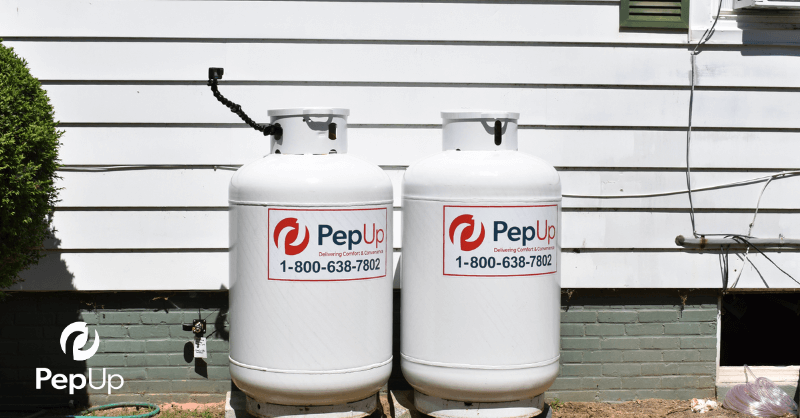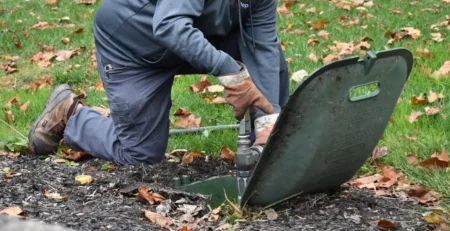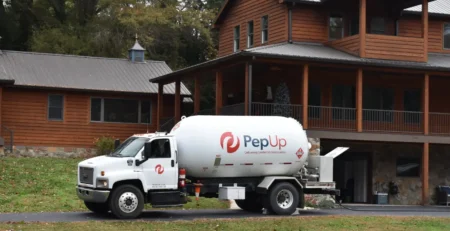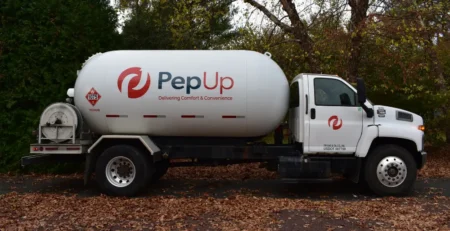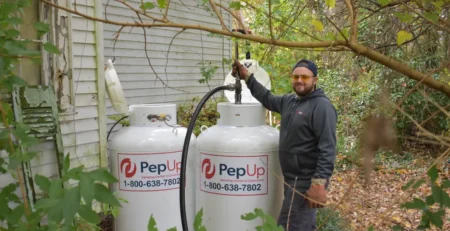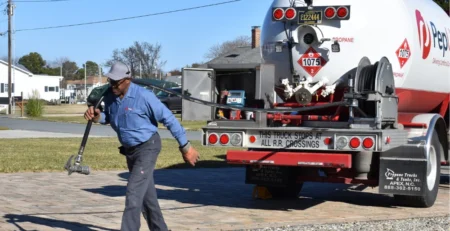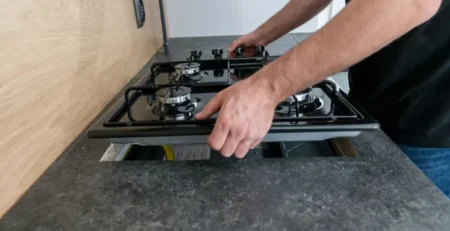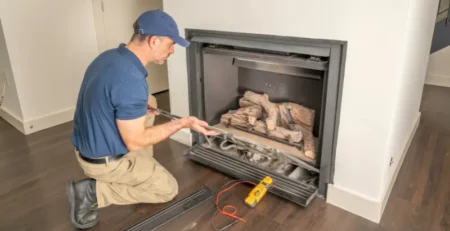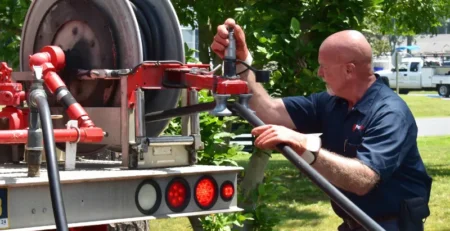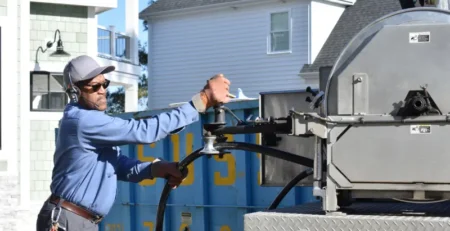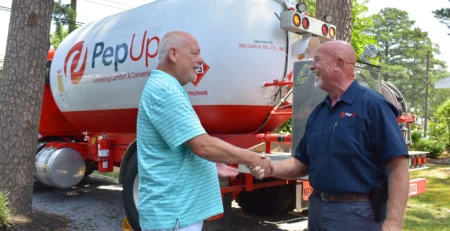The Essential Guide to Propane for Home Heating and More
If you’re considering propane for home heating or appliances, you may have questions about safety, sustainability, efficiency, and what’s involved when you add propane to your home. Whether you’re looking to switch from electric or oil heating, or simply want the ease and convenience of a propane tankless water heater, cooking appliances, or propane fireplace inserts, we’ve created this guide to walk you through the big questions around residential propane.
Let’s start with the basics.
What is Propane?
Propane, also known as liquefied petroleum gas (LPG), is a byproduct of natural gas processing and petroleum refining that is an inexpensive and efficient fuel option for many homeowners. It is most often used in our area to power home furnaces and appliances, and it also has quite a few commercial, fleet, and agricultural applications.
Is propane environmentally friendly?
Propane has clean-burning properties and lower emissions compared to other fossil fuels. Here’s a detailed look at why propane is better for the environment:
- Low Carbon Emissions: Propane produces fewer greenhouse gases than gasoline or diesel. For example, burning one gallon of propane emits 12.61 pounds of CO2, which is significantly lower than other conventional fuels. Propane-powered vehicles also emit up to 25% fewer greenhouse gases and 60% less carbon monoxide compared to gasoline-powered vehicles.
- Clean Burning: Propane is listed as an approved clean energy source under the 1990 Clean Air Act. It does not emit harmful pollutants such as sulfur dioxide, methane, nitrogen oxides, or particulate matter, contributing to cleaner air and reduced acid rain.
- Minimal Environmental Impact from Spills: Unlike oil spills, propane evaporates into the air quickly without contaminating soil or water sources. This makes it safer for sensitive habitats like waterways and marine ecosystems.
- Lower Carbon Intensity: Propane has a lower carbon intensity compared to electricity generated from the U.S. grid or other fossil fuels, making it a more sustainable choice for residential heating and industrial applications.
While propane does emit carbon dioxide during combustion, its overall environmental impact is much smaller than other fossil fuels. Its clean-burning nature and versatility make it a practical and eco-friendly choice for households and businesses.
Is propane safe?
Propane is safe when stored, handled, and used properly, just like any energy source. When propane is used in a home, it’s also important to monitor for leaks and the production of carbon monoxide.
Safety considerations:
- Proper storage is crucial. Propane tanks should never be stored indoors or in enclosed areas like basements, garages, or sheds. Select the right size propane tank for your home, and make sure it’s placed in a location that meets all local regulations and provides easy access for service and deliveries.
- Only use propane appliances as intended. Outdoor appliances should never be used indoors due to the risk of carbon monoxide poisoning.
- Regular maintenance and proper installation of propane systems by qualified professionals is essential.
- Propane has a distinct “rotten egg” odor added to help detect leaks. If you smell it, clear the area and call for emergency propane service.
While propane requires safe handling and respect for its more volatile properties, following proper safety guidelines and regulations ensures that your family will be safe with a supply of propane on site.
Potential hazards:
- Propane is highly flammable and can ignite explosively if exposed to heat or ignition sources. That’s why you never want to allow flames or sparks near a leaking tank or supply line.
- Propane tanks can explode if exposed to extreme heat or pressure.
While propane requires safe handling and respect for its more volatile properties, following proper safety guidelines and regulations ensures that your family will be safe with a supply of propane on site.
How efficient is propane when compared to electricity or heating oil for home heating?
Propane is generally more efficient for home heating compared to electricity and is competitive with heating oil. Here’s a breakdown of the efficiency and reliability comparisons, along with initial and ongoing cost considerations of each energy source:
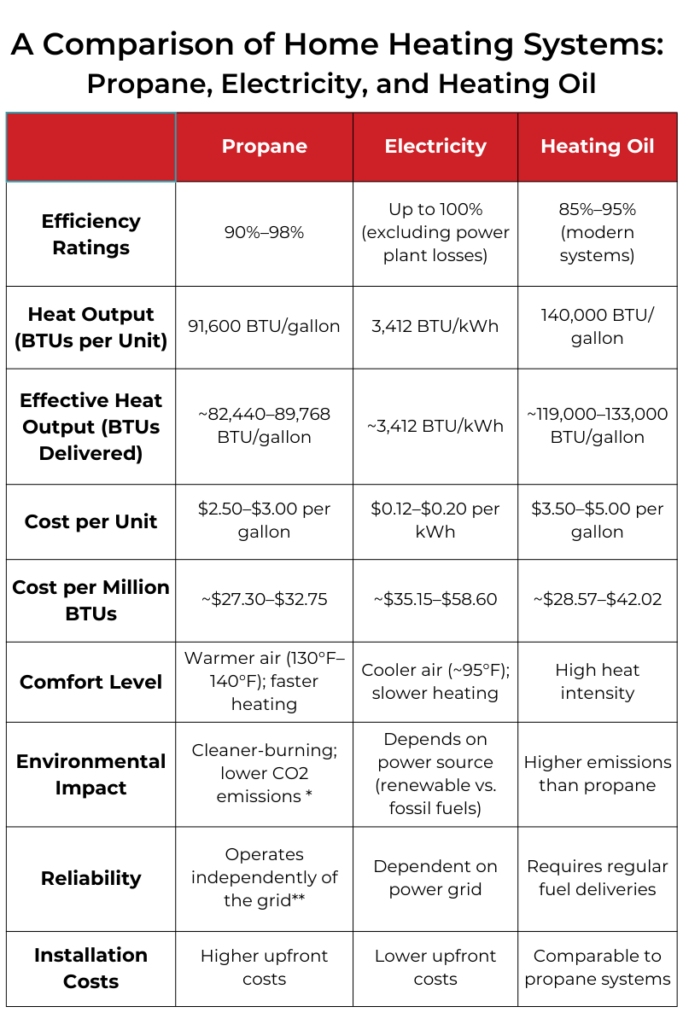
*compared to electricity generated using fossil fuels
**depending on system requirements
Key Comparison Take-Aways:
Propane: Offers a balance of high efficiency and moderate costs per million BTUs while delivering warmer air for comfort. Here’s a breakdown of how to calculate your home’s propane needs, based on how you’ll be using it to power heating systems and appliances. Here’s a breakdown of what factors influence propane cost per gallon.
Electricity: Has the highest efficiency but tends to be more expensive due to higher costs per kWh and potential power plant inefficiencies.
Heating Oil: Delivers the most heat per gallon but has higher emissions and fluctuating costs depending on market conditions. Many homes in our area have older oil furnaces, and they’re much less efficient than modern propane furnaces. Instead of replacing those systems, many homeowners opt to replace their oil heat furnaces with more efficient, cleaner-burning propane heat systems. If you choose to keep your heating oil system, use this guide to residential heating oil to operate and maintain your system effectively.
Benefits of Propane for Homeowners
Propane offers lots of advantages for homeowners, making it an attractive option for those looking to cut energy bills and improve their home’s efficiency.
- Energy Efficiency: Propane appliances often operate more efficiently than their electric counterparts, potentially leading to lower energy bills.
- Versatility: From heating and cooking to powering generators and fireplaces, propane can fuel a wide range of home appliances. If you’re on the fence about which appliances you’ll convert to propane, read about our techs’ top propane appliance picks.
- Reliability: Propane systems can continue to operate during power outages, providing a reliable source of heat and energy.
- Environmental Impact: As a clean-burning fuel, propane produces fewer greenhouse gas emissions compared to many other fossil fuels.
- Cost-Effectiveness: In many regions, propane can be more affordable than electricity for heating and cooking.
Propane Applications in Your Home
Propane can be used for various applications in your home, including:
- Home Heating: Propane home furnaces and boilers can efficiently heat your entire home.
- Water Heating: Tankless propane water heaters provide on-demand hot water, saving energy and space.
- Cooking: Propane stoves and ovens offer precise temperature control for cooking enthusiasts.
- Clothes Drying: Propane dryers can dry clothes faster and more efficiently than electric models.
- Fireplaces and Fire Pits: Enjoy the ambiance of a fire without the hassle of wood with propane-powered fireplaces and outdoor fire pits and patio heaters.
- Backup Generators: Ensure your home has power during outages with a propane-powered generator.
- Propane Pool Heaters: An LPG pool heater can extend your swimming season without the high cost of an electric heater.
Propane Tank Sizes and Installation
Choosing the right propane tank size is crucial for ensuring you have an adequate fuel supply for your needs. Tank sizes typically range from 100 to 1,000 gallons for residential use. Connect with a PepUp Energy Specialist to walk through your home’s unique needs, and we’ll help you choose the right sized tank and make sure it’s in a safe location that’s accessible for propane deliveries.
Factors to consider when choosing a tank size:
- Home size (when using propane for heat)
- Number of people living in the home
- Propane appliances: type, efficiency rating, and average hourly propane usage
- Climate and average number of heating days per year
- Frequency of desired refills
- Tank placement options (larger tanks require more distance from the home)
Tank Installation
Propane tank installation should always be performed by certified professionals to ensure safety and compliance with local regulations. Comfort Plus Services, a trusted HVAC and plumbing company that is part of the Tri Gas Family of Companies, can assist with adding supply lines for appliances when needed. PepUp technicians and drivers provide professional tank installation, supply line installation, and safety checks.
Checking Your Propane Tank Level
Knowing how to check your propane tank level is important when you’re depending on propane for cooking, hot water, or heating. Here are two methods of monitoring your tank levels:
Gauge Reading: Most modern tanks have a built-in gauge that displays the fuel level as a percentage. Always call for a delivery when you’re close to 30% full. A full tank should read 80%, because we leave room in the tank for expansion of the liquid.
Wireless Monitoring: The easiest way to always know your propane levels without stepping outside is to install a wireless propane tank monitor. PepUp installs these devices and monitors tank levels for many of our Automatic Delivery customers, who can access the monitor’s readings via a smartphone app. The best part is that we’ll see when you’re running low and call you to schedule a delivery, so you don’t have to worry about running out of propane.
Benefits of Automatic Delivery:
- Peace of Mind: Never worry about running out of propane while you’re away.
- Consistent Comfort: Maintain a comfortable temperature in your home year-round.
- Protection Against Weather Damage: Prevent frozen pipes and other cold-weather issues, especially if there are times during the year that your home is unoccupied.
- Convenience: No need to schedule deliveries or check tank levels manually. We’ll do it for you, and Promise Plan customers receive priority tank fills.
Automatic Delivery from PepUp comes with a “No Run Out” Guarantee. When paired with The Promise Plan, this means you’ll never run out of propane, you’ll pay a fixed price per gallon, and you won’t have to worry about checking tank levels or calling for delivery. It’s truly the easiest option, and that’s why it’s popular with many Rehoboth Beach residents whose homes are occupied part-time, or whose homes are listed on vacation home rental sites.
Recent Propane Pricing Data
Propane prices in the Mid-Atlantic region are generally stable due to the proximity of a Virginia processing plant, one of two in the United States (the other is in Texas). The average residential propane price doesn’t fluctuate in our area as much as it can in others, which makes propane prices competitive with the cost of other heating fuels.
For the most up-to-date pricing information, contact PepUp for a personalized quote.
Making the Switch to Propane
If you’re considering switching to propane or adding propane to your home, here are the steps to take:
- Assess Your Needs: Determine which appliances you want to run on propane and estimate your usage.
- Choose a Tank Size: Based on your needs, select an appropriate tank size.
- Schedule an Installation: Work with our residential propane team to install your tank and run gas lines.
- Install Propane Appliances: We’ll help you walk through what other HVAC or plumbing changes you might need to make early in the process.
- Set Up a Delivery Schedule: Choose between Will Call or Automatic Delivery for your propane refills, and consider one of our payment options like The Promise Plan.
Let’s Talk About Adding Propane to Your Home
Now that you’re ready to make informed decisions about incorporating propane into your home, call on our trusted Energy Specialists to learn more about next steps. Whether you’re considering a full conversion to propane or simply adding a propane appliance, PepUp is here to guide you through the process and ensure you have a safe, reliable propane system for years to come.

